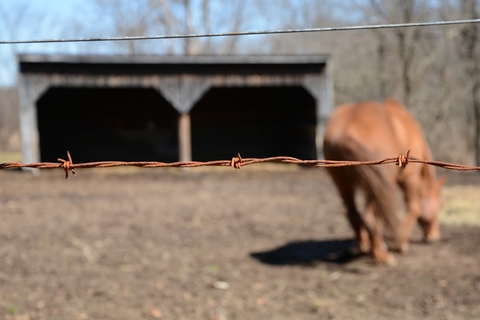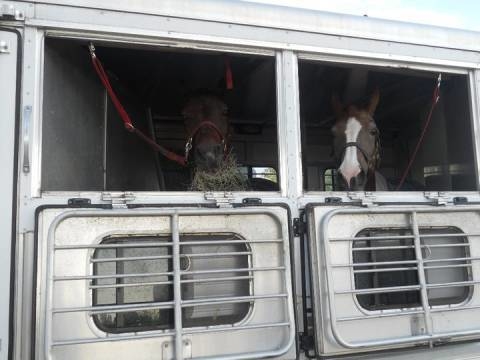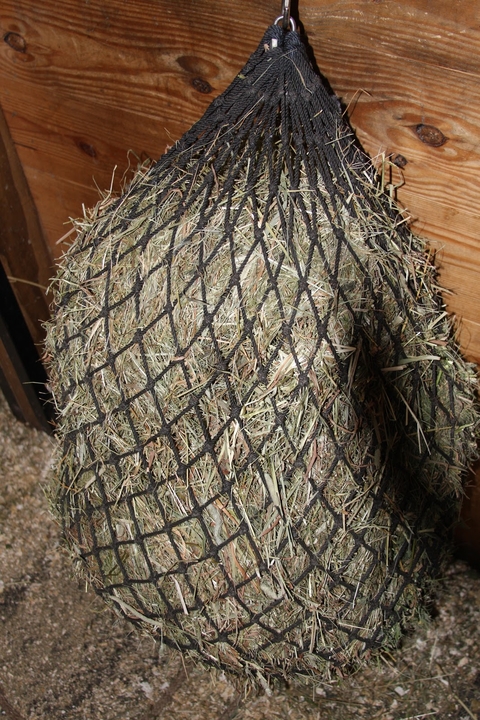Quick facts
Most cost reducing opportunities fall in the area of preventative medicine, education and being a responsible horse owner.
-
Keep your horses on your property if possible to avoid boarding costs.
-
Practice biosecurity and schedule routine physical exams to keep your horse healthy.
-
Improve feed efficiency and reduce storage and feed waste to limit feed costs.
-
Have a good insurance plan and be prepared for emergencies.
-
Be involved in your horse’s daily care.
Owning a horse is a major responsibility, and a significant investment of both time and money. Most owners don’t generate income from their horse, but are intent on spending time with their equine companion. During tough economic times, horse owners need to explore and implement options to reduce costs.
Reducing costs
Keep horses outside
Healthy horses do well outdoors and only need shelter from adverse weather including
-
Excessive heat
-
Excessive cold (below 18 F)
-
Freezing rain
You can save money on building costs and maintenance by keeping your horse outdoors with access to a shelter. It’s not practical to keep all horses outdoors, but healthy adult horses who aren’t in a year-round training program are good candidates.
Manage herds
Make sure horses housed in a herd get along. This will reduce the risk of fighting, injury or stress-related diseases like ulcers. If you add or remove a horse from the herd, expect the herd dynamics to change.
Keep horses at home
It’s usually more cost efficient to keep a horse on the owner's property than boarding. But boarding may be the only option for some horse owners. Consider ways to decrease boarding costs such as
-
Cleaning stalls
-
Feeding
-
Assisting with weekend chores
Flies, mosquitoes and ticks can cause a number of bacterial and viral diseases in horses. Reduce insects and ticks in your horse’s environment to lower the risk and expense of disease.
-
Remove and spread or compost manure promptly to reduce fly breeding areas.
-
Limit pools of standing water, including water in old tires, unused buckets and drainage areas.
-
Clean outdoor water tanks weekly.
-
Remove brushy areas in the pasture and along fence lines and mow tall grass.
-
Use long-acting fly, mosquito and/or tick repellent on horses housed in wooded areas.
Improving barn safety can prevent accidents and unnecessary injuries and related costs.
-
Remove all barbed-wire fencing and cap T-posts.
-
Avoid creating fenced corners where horses can trap their herd mates.
-
Make sure feeders, waterers and other needed items in your horse's pen are in good working condition and free of sharp edges, nails or rust.
-
Check that paddocks and pastures are free of
-
Poisonous plants
-
Large rocks
-
Stumps
-
Brush
-
Holes
-
Debris
-
-
Grade high traffic areas to promote good drainage. This will reduce mud, lower the risk of losing shoes and prevent skin disease of the pasterns.
-
Consider passive solar options for heating outdoor water tanks.
-
Manage dust to reduce airway irritation and the risk of Rhodococcus equi pneumonia in foals.
Biosecurity is preventative steps to reduce disease risk including
-
Having visitors wash hands before handling horses.
-
Having visitors change boots and clothing if they are coming from another farm.
-
Reducing visitor contact with horses.
-
Keeping your horses up-to-date on vaccines and deworming.
-
Separating new horses for 30 days.
When traveling with horses
-
Avoid nose-to-nose contact with other horses.
-
Don’t share water or grain buckets, grooming tools, tack or manure forks.
-
Clean and disinfect stalls and paddocks at off-site facilities and make sure they are free of injury risk.
-
Avoid farms or showgrounds where respiratory diseases, particularly strangles, were recently confirmed.
A poor-fitting saddle can lead to performance problems and back soreness. Saddle choice should reflect the preferred discipline as well as horse and rider comfort. A saddle should have
-
Adequate wither and spine clearance.
-
Even distribution of weight and contact along the panels.
-
Front to back balance.
Saddle fit may change as the horse's body condition changes, particularly if the horse builds more muscle along the topline. Saddle fitting isn’t simple. Consult an expert before purchasing a saddle.
Periodic reflocking and keeping the leather in good condition will promote saddle longevity.
Manure management and removal can be costly for some horse owners. Manure is a valuable resource for gardeners and farmers. Contact local farmers and gardening organizations and promote your manure as a useful resource.
It’s unwise and costly to plan a foal unless the mare or stallion has outstanding conformation and performance records. Consider purchasing or adopting a weaned foal to experience raising and training a foal.
Make sure your homeowner's insurance covers liability associated with your horse operation. Consider having an equine attorney assist with pertinent legal agreements.
Major medical and/or other insurance types may make economic sense for horses that represent a sizeable emotional or financial investment. It’s usually more cost effective for you to be prepared and covered prior to an emergency or accident.
Making sure tow-vehicles and trailers are in good working condition can reduce the chance of accidents.
-
Check the brakes and all lights before traveling.
-
Make sure the tires are properly inflated.
-
Make sure the trailer floor can hold the weight of your horse and is covered in rubber mats.
-
Purchase a roadside assistance plan if you travel often with your horse.
-
Have flares, a tire changing ramp, roadside emergency kit, and a human and horse first aid kit in your trailer.
-
Don’t travel with opened, un-screened windows as debris can strike an eye, or a horse may try to escape.
The Department of Transportation has additional information on hauling requirements and safety.
Emergency and financial plan
Have a good working relationship with your veterinarian. It’s important to determine the extent and financial commitment you can absorb as a horse owner. You should make these decisions prior to an emergency.
During an emergency, it’s common for horse owners to approve procedures they can’t afford. Talking to your veterinarian and horse caretakers about your emergency and financial plans can help keep care and after-care affordable.
Routine exams
You should schedule an annual physical exam for your horse. Before the exam be aware of any health issues or vaccine choices. Thorough physical exams often catch early signs of cancer, lameness or any other disease that’s readily treatable if found early.
Routine blood screening can help detect subtle signs of diminishing organ function in senior horses.
During an annual exam make sure your horse receives the five core vaccines.
-
Tetanus
-
Eastern Equine Encephalomyelitis
-
Western Equine Encephalomyelitis
-
West Nile
-
Rabies
Coggins test, dental work and sheath cleaning (if necessary) should also occur at this time.
Managing manure can reduce parasite problems, which results in better health and longer intervals between deworming.
Trailer to the veterinarian
If you own or have access to a trailer, consider trailering a horse to the veterinarian to save on farm calls.
Education
Research shows that owners involved in the daily care of their horse results in a healthier horse and reduced veterinary costs. Be familiar with your horse’s vitals (temperature, heart rate, etc.) and normal behavior. Changes in these are usually early signs of illness.
Learn to give intramuscular shots and oral medications, and how to perform basic leg wraps.
Take manure samples for a fecal egg count to monitor how effective your deworming program is. Egg counts can show which horses have higher populations of parasites. These horses require deworming more often. Horses with low parasite populations require less frequent deworming. Horses with no detectable parasite eggs may not need deworming, but you should still test them regularly.
Work with a farrier to set a routine hoof care plan based on your horse’s needs. Most horses need hoof trims every five weeks to three months.
Consider leaving the horse barefoot if it has a good quality hoof and stays comfortable when ridden. This may not be an option if the horse
-
Will be working on rough surfaces
-
Requires extra traction
-
Is ridden so often that there’s a lot of hoof wear.
For seasonal riders, removing shoes in the off-season will result in financial savings.
Work with a veterinarian and farrier to correct early hoof problems. This will lessen the stress on joints, ligaments and tendons.
Use feed efficiently to save on feed costs. Refer to the National Research Council’s “Nutrient Requirements of Horses” to understand your horse’s dietary needs. This will help you set up an adequate feeding plan. The greatest financial savings occur when you feed horses individually with the appropriate amount and type of feed.
Good quality hay and a ration balancer can meet the energy and nutrients of most adult, idle horses. Have your hay tested to decide whether your horse needs additional grain or supplements for the following
-
Energy
-
Protein
-
Calcium
-
Phosphorus
Testing your hay costs less than buying grains your horse doesn’t need. Working, growing and reproducing horses may need grain to meet their higher energy needs.
All horses need access to clean water and salt. Make sure your horse is receiving enough vitamins and minerals. Avoid relying on mineral or vitamin blocks as these can lead to
-
Over or under consumption of nutrients
-
Waste
-
Increased costs
A ration balancer allows you to provide and monitor your horse’s vitamin and mineral intake.
Forage
Forage should comprise at least 50 percent of a horse’s diet. Invest in good quality hay, which is weed, dust and mold free. While less costly, low quality hay usually
-
Is more mature
-
Has fewer nutrients
-
Is less digestible
When feeding low quality hay, you’ll likely need to feed more to maintain your horse’s body condition.
Keep your hay type consistent to reduce health problems such as colic.
The average adult horse needs about 2 percent of its bodyweight in feed (hay and grain combined) daily. The Healthy Horse app can help you predict your horse’s weight. Use a scale to weigh the total amount of feed to make sure your horse receives the recommended amount. Weighing feed can lead to great savings by preventing over or underfeeding.
Reducing hay waste
-
Store hay inside, or under cover (i.e. tarp) if stored outside.
-
If you store hay inside, make sure the roof is watertight to prevent mold.
-
-
Animal-proof hay (and grain) storage areas.
-
Animals (especially wild animals) can carry disease and make messes in feed areas.
-
-
Store hay on pallets and in well-drained areas.
-
Hay bales stored on wet ground can lead to 50 percent spoilage.
-
Use feeders for hay and grain to prevent waste. For more information see selecting round-bale feeders or selecting small square-bale feeders.
Grazing
Pasture is an affordable way to meet a horse’s nutrient needs in the summer. Consider rotational grazing to avoid overgrazing and get the most out of your pasture. For more information see pasture management.
When to not reduce costs
It’s not appropriate to cut costs on the following.
-
Buying quality hay.
-
Emergency care: If your horse needs a veterinarian, don’t hesitate to contact one. Waiting can lead to added costs with procedures and after care.
-
Using a professional (veterinarian, farrier, nutritionist, etc.) when your horse needs one.
-
Core vaccinations and dental exams: Preventing disease is more cost effective than treating a sick horse.
Reviewed in 2021




